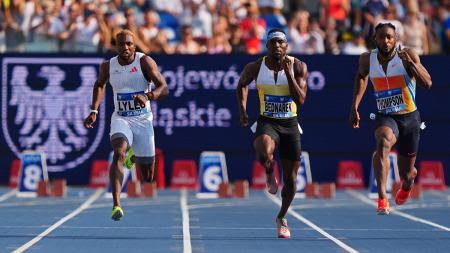
When Kishane Thompson and Noah Lyles lined up for their much-anticipated Olympic final rematch, the atmosphere was charged with tension. Track fans around the world had been waiting for this duel ever since their first Olympic showdown, and the stage was set for another unforgettable chapter in sprinting history. Both men carried heavy expectations: Thompson, the rising Jamaican star who has been touted as the future of sprinting, and Lyles, the flamboyant American champion with a history of delivering on the big stage.
From the opening moments, it was clear this was going to be a razor-thin battle. Lyles, known for his explosive starts and unshakable confidence, got out of the blocks with purpose. For the first 30 meters, he appeared to have the slight advantage, his arms pumping with aggression and his stride crisp and efficient. Thompson, however, stayed composed. His smooth acceleration phase, always his greatest weapon, began to close the gap as the race unfolded. By the halfway point, both men were virtually level, neither willing to give an inch.
As the race surged toward its climax, the contrast in styles became evident. Lyles leaned on his raw drive and competitiveness, pushing hard to keep control, while Thompson relied on his fluid mechanics, looking almost effortless as he gathered momentum. With 20 meters remaining, the crowd roared as the two sprinters were inseparable. It was the kind of finish that defines championships: two of the fastest men alive, locked in a dead heat, the outcome hinging on a fraction of a second.
At the line, Thompson executed a perfectly timed dip, edging ahead by the slimmest of margins. The stadium erupted as the scoreboard confirmed the result: Thompson first, Lyles second, the difference a whisper of time. For Thompson, it was vindication—a declaration that his Olympic success was no fluke, and that he could beat the very best under the brightest lights. For Lyles, it was a stinging reminder of how fine the margins are in sprinting, where years of preparation can be decided by hundredths of a second.
Beyond the result, the race carried deeper significance. The rivalry between Thompson and Lyles has become one of the defining narratives of modern athletics. Their contrasting personalities—Thompson’s calm, reserved demeanor versus Lyles’ showmanship and charisma—add layers of intrigue that captivate fans. This rematch was not just about who crossed the line first; it was about pride, legacy, and the battle for supremacy in the 100m, the most iconic event in track and field.
The implications for the future are immense. Thompson’s victory cements his status as Jamaica’s next great sprinting hero, following in the footsteps of legends like Usain Bolt and Asafa Powell. His ability to handle pressure, stay composed, and deliver when it matters most will fuel expectations that he could dominate the event in the years to come. Lyles, on the other hand, is far from finished. His competitive fire and relentless drive mean he will no doubt come back stronger, using this narrow defeat as motivation to sharpen his craft.
Ultimately, this Olympic rematch delivered everything fans could have hoped for—drama, intensity, and a finish that will be remembered for years. Thompson may have edged Lyles this time, but the rivalry is far from over. Track and field has a new duel to savor, one that promises to define the sprinting landscape for the foreseeable future.
Be the first to comment